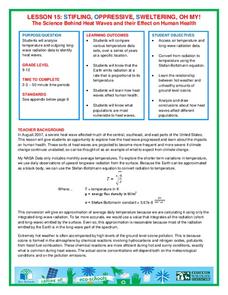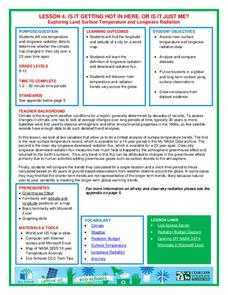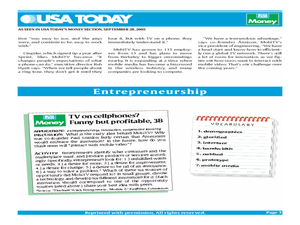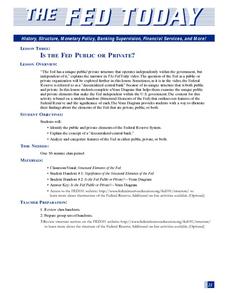National Wildlife Federation
Stifling, Oppressive, Sweltering, Oh My!
Looking for a hot date? Pick any day in August, statistically the hottest month in the United States. The 15th lesson in the series of 21 instructs pupils to investigate the August 2007 heat wave through NASA data, daily temperature...
National Wildlife Federation
I’ve Got the POWER! Solar Energy Potential at Your School
Should every school have solar panels? The 19th activity in a series of 21 has scholars research the feasibility of using solar panels at their school. They begin by gathering data on the solar energy in the area before estimating the...
National Wildlife Federation
Green Green Revolution
School budgets don't have a lot of extra money, so when students propose saving the district money, everyone jumps on board. The first lesson in the series of 21 introduces the concept of an energy audit. Scholars form an eco-action team...
National Wildlife Federation
Wherefore Art Thou, Albedo?
In the sixth lesson in a series of 21, scholars use NASA data to graph and interpret albedo seasonally and over the course of multiple years. This allows learners to compare albedo trends to changes in sea ice with connections to the...
National Wildlife Federation
Citizen Science to the Rescue!
You don't have to be a scientist or even out of high school to contribute to scientific research. In the 12th lesson in the series of 21, scholars use this opportunity to add to the growing body of scientific knowledge and consider the...
National Wildlife Federation
Quantifying Land Changes Over Time Using Landsat
"Humans have become a geologic agent comparable to erosion and [volcanic] eruptions ..." Paul J. Crutzen, a Nobel Prize-winning atmospheric chemist. Using Landsat imagery, scholars create a grid showing land use type, such as urban,...
National Wildlife Federation
Is It Getting Hot in Here, or Is It Just Me?
Currently, only 2.1% of global warming is felt on continents, while over 93% is felt in the oceans. The fourth activity in the series of 21 on global warming is composed of three activities that build off one another. In the first...
National Wildlife Federation
What is DBH?
When measuring the circumference of a tree, does it matter how high you place the measuring tape? Most scholars have never considered this question, but scientists know that measurement techniques must be standardized. The 13th lesson in...
Curated OER
China: Land Beyond the Wall
An excellent series of five lessons on China awaits you and your young geographers. In these lessons, learners engage in hands-on activities, watch streamed video, access websites, and complete activities in cooperative groups in order...
Curated OER
Sounds Like Great Science!
A phenomenal lesson on sound is here for your third graders! In it, learners engage in hands-on activities, watch video, take part in Internet activities, and complete tasks in cooperative groups in order to explore the world of sound...
NOAA
Watch the Screen!
Can a sponge cure cancer? Life science pupils visit the drugstore under the sea in the fifth lesson of six. Working groups research the topic then get hands-on experience by testing the inhibiting effects of several plant extracts...
NOAA
Methane Hydrates – What's the Big Deal?
Have you ever tried to light ice on fire? With methane hydrate, you can do exactly that. The ice forms with methane inside so it looks like ice, but is able to burn. The lesson plan uses group research and a hands-on activity to help...
NOAA
Biological Oceanographic Investigations – Call to Arms
How many simple machines does it take to make a robotic arm? An inquiry-based lesson explores that topic and challenges pupils to build a robotic arm that can stretch, turn, and more. A few questions help guide them in the...
Curated OER
Children's Books
A challenging lesson on writing a book for children awaits your fifth-graders. They must use laptops, document cameras, and a projector to create and present an original piece of writing. A checklist that has all of the requirements for...
Curated OER
Business Communication 1
Students examine a variety of methods that can be used to communicate information, and the process of communication. They analyze various business communication scenarios and write reports on their opinions of the situations.
Curated OER
TV on Cell phones? Funny but Profitable
Pupils explore the concept of technology. In this technology lesson, students read an article about television on a cell phone. Pupils discuss why MobiTV was successful. Students discuss a technology and possible innovations to improve...
Curated OER
Does Order Really Matter?
Investigate the order of operations! Learners participate in interactive multi-media activities to examine and solve multi-step equations, inequalities. They evaluate formulas and simplify monomials and polynomials.
Curated OER
9/11 Backlash: Being Muslim In America
Discover the experience of being Muslim in America. In this diversity lesson, watch "9/11 Backlash: Being Muslim in America," and research how Muslims are portrayed in American television and movies. Debate the media portrayal of Muslims.
WindWise Education
What is Wind Power's Risk to Birds?
How is risk determined? Through the use of a reading passage, individuals or groups learn about bird interactions with man made structures along with wind turbines. Pupils use information from the second reading passage to conduct an...
Federal Reserve Bank
Expense Tracking
Where does all your money go? Individuals keep a record of the money they spend over the course of 30 days. They then categorize where they are spending their money and write an essay detailing their findings.
Foreign Policy Research Institute
Teaching the 9/11 Anniversary
Here is a lesson on terrorism and 9/11. While outdated, it could be easily revised for today's teens. It includes targeted vocabulary, a background information activity, critical thinking questions, and step-by-step procedures for...
Federal Reserve Bank
Is the Fed Public or Private?
The Federal Reserve System as a decentralized central bank can be a difficult concept for learners to grasp. Help them get a firm handle on this concept using this resource, in which class members work as a group to identify the...
Federal Reserve Bank
The Fed's Role in Making and Setting Monetary Policy: Part 1
How does inflation affect the economy, and how can effective monetary policy by the Federal Reserve help control inflation? With the Fisher equation and analysis of annual CPI rates during the 1970s and early 1980s, your...
Curated OER
Call to Arms: Robotic Analogues for Human Structures
Investigate deep sea discovery through the emerging technology being built. For this physical science lesson, students analyze the different types of motion available in the human arm. Students research educational websites...

























